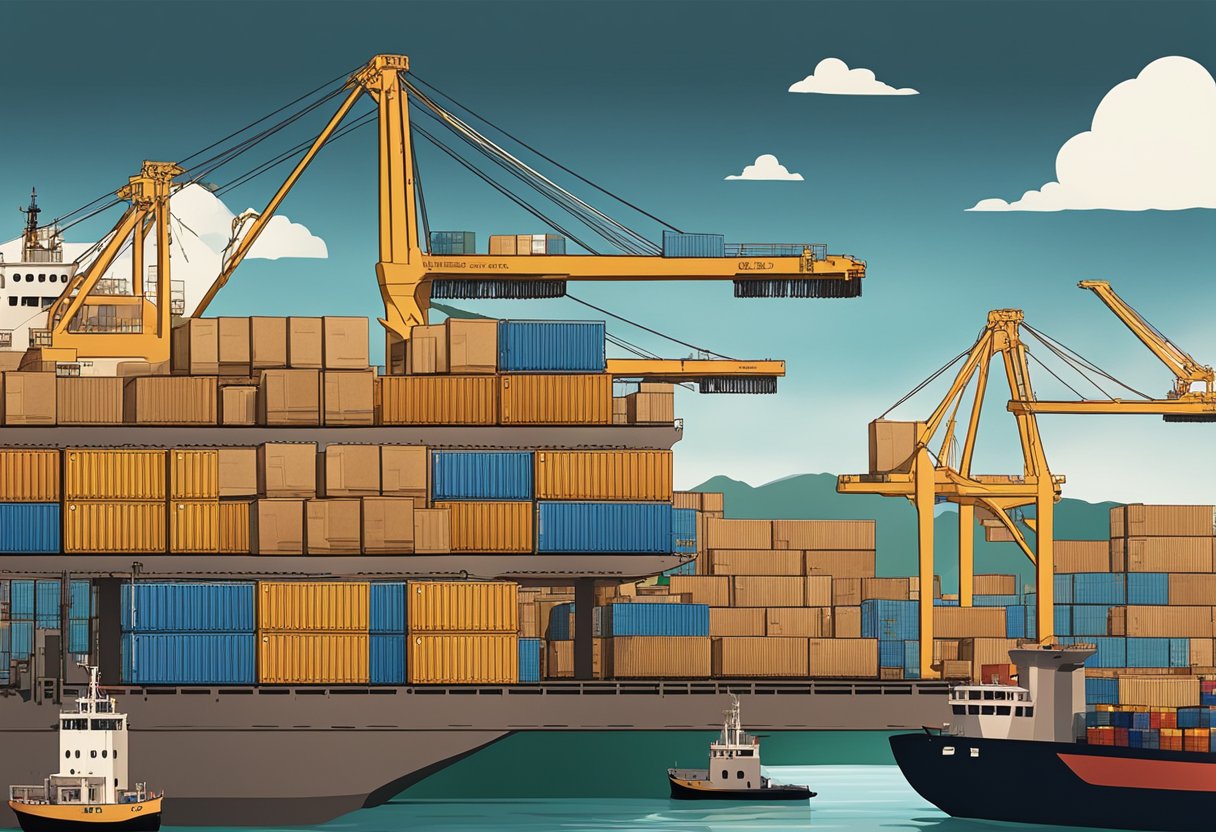Importing products from China can be a profitable business venture for small business owners, but the process can be intimidating, especially for those who are new to the industry. The idea of importing products from China may seem overwhelming, but it is not as complicated as it may seem. In fact, importing small quantities of products from China can be a great way for small business owners to test the waters and see if importing is right for them.
The first step in importing small quantities from China is to research the products that you are interested in importing. This research should include identifying the products that are in demand in your market, as well as the suppliers who can provide those products. Once you have identified the products and suppliers that you are interested in, you can begin the process of importing those products. This process involves negotiating with suppliers, arranging for shipping and handling, and ensuring that all necessary documentation is in order.
Identifying Suitable Products and Suppliers
Importing small quantities from China can be a daunting task, but it can also be very rewarding if done correctly. The first step in the process is identifying suitable products and suppliers. The following tips can help you with this process:
Determine Your Product Selection Criteria
Before you start looking for products and suppliers, you need to determine your product selection criteria. This includes factors such as the market demand for the product, profit margins, and shipping costs. You should also consider the quality of the product and the supplier’s reliability.
Research Different Products
Once you have determined your product selection criteria, you can start researching different products. You can use Alibaba, AliExpress, and other wholesale marketplaces to find interesting products. You can also look for fashion accessories, electronics, and other products that are in high demand.
Find Chinese Suppliers
Once you have identified interesting products, you can start looking for Chinese suppliers. You can use Alibaba, AliExpress, and other wholesale marketplaces to find Chinese suppliers. You can also use a sourcing agent or trading company to help you find suppliers. When looking for suppliers, you should consider their reputation, experience, and reliability.
Evaluate the Supplier’s Product Portfolio
Before you start working with a supplier, you should evaluate their product portfolio. This will give you an idea of the types of products they offer and their quality. You should also consider their prices and minimum order quantities.
Consider the Supplier’s Location
When selecting a supplier, you should also consider their location. If you are importing small quantities, it may be more cost-effective to work with a supplier that is located closer to your country. This will help you save on shipping costs and reduce delivery times.
By following these tips, you can identify suitable products and suppliers for your small quantity import business. Remember to research thoroughly and evaluate suppliers carefully to ensure a successful import experience.
Understanding The Import Process
Importing products from China can be a daunting task, especially for those who are new to the process. However, with a little guidance, it can be a straightforward and profitable experience. Here is a brief overview of the import process for small quantities from China:
Volume and MOQs
When importing small quantities from China, it is important to understand the concept of MOQs (Minimum Order Quantities). MOQs are the minimum amount of products that a supplier is willing to sell. They can vary depending on the product, supplier, and other factors. It is important to negotiate MOQs with the supplier before placing an order to ensure that the order value is not too high.
Samples and Customized Products
Before placing a large order, it is recommended to request samples from the supplier. This will help to ensure that the product quality meets your standards and that the supplier is reliable. If you require customized products, it is important to provide clear specifications to the supplier to avoid any misunderstandings.
Certification and Branding
Depending on the product, it may be necessary to obtain certification to comply with regulations in the importing country. It is important to research and understand the certification requirements before placing an order. Additionally, it may be beneficial to consider branding the product to differentiate it from competitors.
Shipping and Customs Clearance
When shipping small quantities, LCL (Less than Container Load) shipping is often the most cost-effective option. However, it is important to ensure that all customs clearance requirements are met to avoid any delays or additional fees. Working with a customs clearance agent can help to ensure a smooth import process.
Duties, Taxes, and Licenses
Importing products from China may be subject to duties and taxes. It is important to research and understand the duty and tax rates before placing an order to avoid any unexpected costs. Additionally, depending on the product, it may be necessary to obtain licenses or permits to import the product.
Product Quality
Ensuring product quality is essential for customer satisfaction and repeat business. It is important to communicate quality requirements clearly with the supplier and to conduct quality inspections before shipping the products.
Technology
Technology can play a significant role in the import process, from sourcing suppliers to tracking shipments. Utilizing technology such as online marketplaces and shipment tracking tools can help to streamline the import process and improve efficiency.
In summary, importing small quantities from China can be a profitable venture with the right knowledge and preparation. Understanding the import process, negotiating MOQs, requesting samples, obtaining certification, branding the product, ensuring customs clearance, researching duties and taxes, ensuring product quality, and utilizing technology can all contribute to a successful import experience.
Cost Considerations and Profit Margins
When importing small quantities from China, it is crucial to consider all costs and fees associated with the process to ensure a profitable venture. The most significant cost consideration is the shipping cost, which can be high for small quantities. Air freight is a common option for small shipments, but it can be expensive, especially for products that are heavy or bulky. Therefore, it is essential to find the right balance between the shipping cost and the product’s price to ensure a reasonable profit margin.
Another cost consideration is the VAT and customs fees, which vary depending on the product’s value and the country of import. It is crucial to research and understand the VAT and customs fees of the destination country to avoid any surprises and ensure a smooth import process.
Moreover, e-commerce platforms such as Amazon and eBay charge fees for listing and selling products, which can affect the profit margin. Therefore, it is essential to factor in these fees when calculating the product’s price and profit margin.
Low prices can be attractive, but it is crucial to consider the MOQ (Minimum Order Quantity) of the supplier. High MOQs can make it challenging to import small quantities, and it may not be cost-effective to order more than required. Therefore, it is essential to find a supplier with a reasonable MOQ to ensure a profitable venture.
Transportation costs can also affect the profit margin. Therefore, it is crucial to research and compare shipping options and choose the most cost-effective one. Lead time is another factor to consider when choosing a shipping option. It is essential to find a balance between lower costs and lead time to ensure timely delivery and a reasonable profit margin.
In summary, when importing small quantities from China, it is essential to consider all costs and fees associated with the process to ensure a profitable venture. It is crucial to find the right balance between the shipping cost and the product’s price, factor in VAT and customs fees, consider e-commerce platform fees, choose a supplier with a reasonable MOQ, and research and compare shipping options to ensure a reasonable profit margin.
Dealing with Shipping and Logistics
When it comes to importing small quantities from China, shipping and logistics can be a major challenge. However, there are several options available to manage this process effectively.
One option is to use express delivery services such as UPS, DHL, or FedEx. These services are ideal for small orders and offer reliable transportation at a reasonable cost. However, they may not be the most cost-effective option for larger orders.
Another option is to use a freight forwarder. Freight forwarders specialize in managing the transportation and logistics of international shipments. They can help you navigate the complexities of shipping and ensure that your goods arrive on time and in good condition. However, freight forwarders can be expensive, and it’s important to choose a reliable provider to avoid delays and other issues.
Transportation costs are a major consideration when importing from China. It’s important to factor in shipping costs when calculating the total cost of your order. This includes not only the cost of transportation but also any duties, taxes, and other fees that may be levied on your shipment.
In addition to transportation costs, it’s important to consider the reliability of your shipping provider. Delays can be costly, and it’s important to choose a provider that has a track record of delivering goods on time and in good condition.
Finally, it’s important to consider the local market when importing from China. Different regions may have different shipping and logistics requirements, and it’s important to be aware of these when planning your shipment. It’s also important to work with a provider that has experience in the local market and can help you navigate any regulatory or logistical challenges that may arise.
Frequently Asked Questions
What are the requirements for importing goods from China to the USA?
Importing goods from China to the USA requires compliance with various regulations set by the US Customs and Border Protection (CBP). Some of the requirements include obtaining an import license, filing an entry summary, and paying duties and taxes. Additionally, the imported goods must meet the safety and quality standards set by the US government. It is advisable to consult with a customs broker or freight forwarder to ensure compliance with all requirements.
How do I calculate the taxes and duties for importing from China to the UK?
Calculating taxes and duties for importing from China to the UK depends on several factors such as the value of the goods, the type of goods, and the country of origin. The UK government provides a tariff calculator that can be used to estimate the taxes and duties for specific products. Importers can also consult with a customs broker or freight forwarder to obtain accurate calculations.
What is the process for importing small items from China without an agent?
Importing small items from China without an agent requires careful planning and research. The process involves finding a reliable supplier, negotiating terms, arranging for shipping, and handling customs clearance. Importers can use online marketplaces such as Alibaba or Global Sources to find suppliers. It is also important to ensure compliance with all regulations and obtain necessary documentation such as a commercial invoice and bill of lading.
What are the best practices for importing pallets from China?
Importing pallets from China requires proper planning and coordination. Some of the best practices include finding a reliable supplier, ensuring compliance with regulations, selecting the appropriate shipping method, and managing logistics. It is also important to conduct quality control inspections and obtain necessary documentation such as a packing list and certificate of origin.
How do I start a mini importation business from China?
Starting a mini importation business from China requires careful planning and research. Some of the key steps include identifying the target market, selecting the right products, finding reliable suppliers, managing logistics, and handling customs clearance. It is also important to establish a strong online presence and develop a marketing strategy to reach potential customers.
What are the risks and challenges of importing goods from China?
Importing goods from China can pose various risks and challenges such as quality control issues, language barriers, cultural differences, and logistics challenges. Additionally, there may be legal and regulatory challenges such as compliance with customs regulations and intellectual property rights. It is important to conduct thorough research and due diligence to mitigate these risks and challenges.


